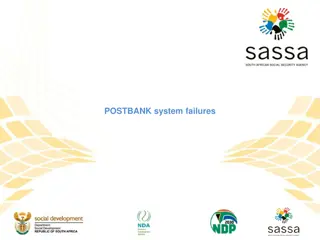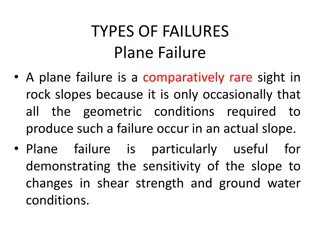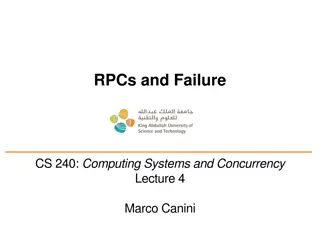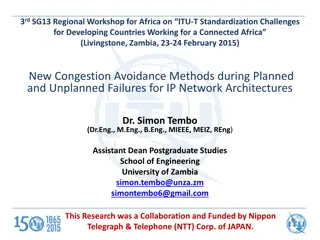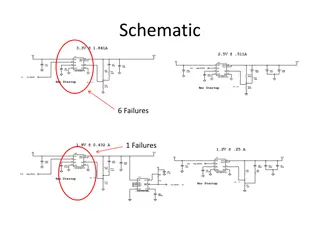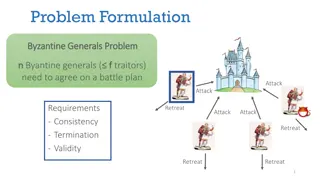Main Failures Faced by the Reserve Bank of India
The Reserve Bank of India has encountered several challenges including lack of adjustment in the money market, absence of uniformity in interest rates, inadequate bill market development, insufficiency of agricultural credit availability, lack of banking facilities in rural areas, and instability in
2 views • 11 slides
Update on Postbank System Failures and Challenges in Social Grant Payments
The presentation outlines the recent system failures experienced by Postbank, affecting social grant payments. Funds were deducted from accounts but not reverted after failed withdrawals. Postbank has corrected most accounts manually, but some beneficiaries may still need assistance. Challenges incl
0 views • 8 slides
Understanding Over-Pressurized Filters in Jeep Reverse Plug and Kia/Hyundai Engine Recall
Learn about the risks of over-pressurized filters in Jeep Reverse Plug systems and the significant Kia/Hyundai engine recall affecting millions of vehicles due to potential engine failures. Explore the connection between oil pressure issues, engine machining errors, and the importance of using compa
3 views • 14 slides
Business Continuity Exercise Information and NHS England Emergency Preparedness
The content focuses on a business continuity exercise related to NHS England Emergency Preparedness, emphasizing the importance of evaluating and enhancing business continuity plans. It covers elements of business continuity management, exercise objectives, ground rules, scenario background, and res
3 views • 16 slides
Overview of Distributed Systems: Characteristics, Classification, Computation, Communication, and Fault Models
Characterizing Distributed Systems: Multiple autonomous computers with CPUs, memory, storage, and I/O paths, interconnected geographically, shared state, global invariants. Classifying Distributed Systems: Based on synchrony, communication medium, fault models like crash and Byzantine failures. Comp
9 views • 126 slides
Understanding Electromigration Effects in IC Interconnect Lines
Background: As IC circuits advance, preventing failures like electromigration is crucial. Vacancies lead to potential failures in metal interconnects by causing macroscopic voids and hillocks. Explore the governing equations and physics interfaces behind the migration of vacancies in IC circuits. Im
0 views • 14 slides
Understanding Byzantine Fault Tolerance in Distributed Systems
Byzantine fault tolerance is crucial in ensuring the reliability of distributed systems, especially in the presence of malicious nodes. This concept deals with normal faults, crash faults, and the challenging Byzantine faults, where nodes can exhibit deceptive behaviors. The Byzantine Generals Probl
0 views • 29 slides
Overcoming Failures: A Christian Perspective on Dealing with Setbacks
Discover how Christians can navigate failures by seeking repentance, accepting consequences, and pressing forward with faith. Learn from biblical examples like Judas, Peter, and Paul to embrace growth through failure and never give up in the face of challenges.
0 views • 18 slides
Understanding System Reliability in Engineering
System Reliability in Science/Engineering involves understanding how products/systems work, as well as the ways they fail and the effects of failures. Reliability is the probability that a system will perform as expected under given conditions and play a crucial role in the design phase to mitigate
0 views • 19 slides
Understanding Electronic Centralized Aircraft Monitoring (ECAM) Systems
Electronic Centralized Aircraft Monitoring (ECAM) is a vital system that collects data from sensors throughout the aircraft, processes it, and displays key information to pilots efficiently. The system is composed of various components like System Data Acquisition Concentrators (SDACs), Flight Warni
0 views • 6 slides
Understanding Plane Failures in Rock Slopes
Plane failures in rock slopes are rare but significant, indicating sensitivity to changes in shear strength and groundwater conditions. Geometrical conditions must be met for such failures to occur, including specific alignments and interactions between the sliding plane and slope face. Analysis inv
0 views • 22 slides
Understanding Wedge Failures in Geotechnical Engineering
Wedge failures in geotechnical engineering occur when slopes with discontinuities experience sliding along the line of intersection of two planes. This type of failure can happen under various geological and geometric conditions and involves specific criteria such as the dip of the intersecting plan
0 views • 13 slides
Understanding Byzantine Fault Tolerance: A Comprehensive Overview
Byzantine Fault Tolerance (BFT) is a critical concept in computer science, addressing faults in distributed systems. This summary covers the types of faults (normal, crash, Byzantine), implications of Byzantine faults, Byzantine Generals Problem, impossibility results, and the complexity of solving
3 views • 29 slides
Understanding and Managing Success and Failures: A Comprehensive Guide
Explore the contrasting lives of Ralph Lauren and Victor Green, highlighting the importance of managing both success and failures. Learn about overcoming fears, identifying root causes of emotions, enhancing self-esteem, stress management techniques, and efficient traits for managing success and fai
0 views • 12 slides
Importance of Software Testing in Preventing Catastrophic Failures
Software testing is crucial in ensuring the reliability and safety of software systems, as highlighted by catastrophic failures such as the Ariane 5 rocket incident and the Therac-25 radiation therapy machine disasters. These examples underscore the importance of thorough testing in identifying and
1 views • 42 slides
Handling Failures in RPC Systems: Strategies and Considerations
Exploring the challenges and strategies for handling failures in RPC systems, this lecture delves into potential issues such as client crashes, packet loss, server failures, and network slowdowns. The At-Least-Once scheme is discussed as a simple method for managing failures and ensuring data integr
2 views • 22 slides
Round-Efficient Byzantine Broadcast Under Strongly Adaptive and Majority Corruptions
This paper discusses a round-efficient Byzantine broadcast protocol that addresses strong adaptive adversaries and majority corruptions. The protocol involves unique and unbreakable peer signatures, committees for message verification, and time-locking mechanisms to prevent message tampering. By uti
1 views • 5 slides
Economic Models of Consensus on Distributed Ledgers in Blockchain Technology
This study delves into Byzantine Fault Tolerance (BFT) protocols in the realm of distributed ledgers, exploring the complexities of achieving consensus in trusted adversarial environments. The research examines the classic problem in computer science where distributed nodes communicate to reach agre
0 views • 34 slides
Byzantine Failures and CAP Theorem Overview
Byzantine failures refer to arbitrary patterns of failures where nodes exhibit inconsistent behavior. This lecture discusses Byzantine agreement and the challenges in reaching consensus with faulty nodes. It explores the minimum number of processes needed for consensus and extends the concepts to ge
1 views • 32 slides
Distributed Consensus Models in Blockchain Networks
Economic and technical aspects of Byzantine Fault Tolerance (BFT) protocols for achieving consensus in distributed ledger systems are explored. The discussion delves into the challenges of maintaining trust in adversarial environments and the strategies employed by non-Byzantine nodes to mitigate un
0 views • 34 slides
New Congestion Avoidance Methods for IP Networks
This research presentation highlights the challenges of IP network failures, focusing on planned and unplanned scenarios. Dr. Simon Tembo discusses innovative methods to prevent congestion during failures, including a backup topology design for unplanned failures and a congestion avoidance approach
2 views • 40 slides
Geometric Routing Concepts and Byzantine Fault Tolerance
Geometric Routing enables routing without overhead, where each node knows its global coordinates and forwards messages based on proximity to the destination. Byzantine Faults pose challenges with arbitrary node behavior, but a Byzantine-Robust Geometric Routing algorithm addresses this in a 3-connec
2 views • 33 slides
Causes of the Great Depression: Economic Turmoil and Bank Failures
The Great Depression was characterized by an extraordinary reversal from prosperity to misery in the American economy. Factors such as a sharp decline in demand for goods, bank failures, and the Federal Reserve System's actions contributed to the crisis. The failure to prevent bank failures and the
0 views • 19 slides
Engine Component Failure Identification in Spring 2020 - Common Tests and Real-world Examples
In this presentation, students are tasked with connecting common engine performance test results with real-world component failures. The slides include images and descriptions of various failures such as blown head gasket, worn piston rings, burned valves, damaged cylinder walls, and more. The goal
0 views • 13 slides
Visual Insights into Schematic Failures and Bench Analysis
Explore detailed images showcasing schematic failures, analysis from schematics, web bench inputs, and re-compilation processes. Gain a deeper understanding of these visual representations in the context of technical failures and web bench activities.
0 views • 4 slides
Exact Byzantine Consensus on Undirected Graphs: Local Broadcast Model
This research focuses on achieving exact Byzantine consensus on undirected graphs under the local broadcast model, where communication is synchronous with known underlying graphs. The model reduces the power of Byzantine nodes and imposes connectivity requirements. The algorithm involves flooding va
0 views • 7 slides
Byzantine Generals Problem in Distributed Systems
The Byzantine Generals Problem addresses how a group of generals, some of whom may be traitors, can reach a consensus on a battle plan while ensuring consistency, termination, and validity. Various protocols are explored to handle challenges such as faulty leaders, consistency violations, and cheati
0 views • 23 slides
Handling Errors and Failures in Software Design and Implementation
Exploring the concepts of dealing with errors and failures in software development, focusing on assertions and exceptions. Discusses the importance of preventing complete failures, giving information about problems, and preventing harm when things go wrong. Emphasizes the significance of structuring
0 views • 37 slides
Influence of Mary in Byzantine and Western Art Through the Ages
The influence of Mary, the mother of Jesus, in Byzantine and Western art is explored through various historical events and artworks. From early visions of Mary to the declaration of Feast of Dormition, the devotion to Mary has shaped artistic representations and church dedications. Iconic cathedrals
0 views • 18 slides
Byzantine Faults and Consensus on Unknown Torus
The discussion revolves around achieving consensus in the presence of dense Byzantine faults on an unknown torus. Various challenges and impossibility theorems are explored, highlighting the complexities of reaching an agreement in such fault-prone environments. The content delves into the limitatio
0 views • 23 slides
Overview of Datacenter Operations and Failures
The content discusses datacenter organization, frequent failures, and the prevalence of datacenters in modern computing. It details the typical first-year failures in a new datacenter and highlights the number of servers per datacenter and the shift towards datacenter-centric computing.
0 views • 10 slides
Byzantine Fault Tolerance: Protocols, Forensics, and Research
Explore the realm of Byzantine fault tolerance through protocols like State Machine Replication and HotStuff, discussing safety, liveness, forensic support, and the impact of Byzantine faults. Dive into decades of research on achieving fault tolerance and examining forensic support in the face of By
0 views • 24 slides
The Contributions of the Byzantine Empire to Civilization
The Byzantine Empire made significant contributions to civilization through art, law, religion, and centralization of government. The empire's legacy includes the preservation of Roman laws, promotion of Christianity, accumulation of church wealth, and establishment of Constantinople as a key center
0 views • 22 slides
Optimally Resilient Asynchronous Multi-Valued Byzantine Agreement
Exploring the challenges and solutions in achieving optimally resilient asynchronous multi-valued Byzantine agreement protocols. This work presents a novel construction meeting key requirements and delves into round-preserving parallel composition of agreements, shedding light on probabilistic termi
0 views • 19 slides
Comprehensive Guide to Failure Mode and Effect Analysis (FMEA)
Failure Mode and Effect Analysis (FMEA) is a crucial process that identifies potential failures in products or processes, evaluates their impact, and proposes actions to prevent or mitigate these failures. FMEA aims to prevent problems, improve product development, ensure regulatory compliance, and
0 views • 34 slides
The Byzantine Empire: Society, Achievements, and Decline
The Byzantine Empire, established in 527 A.C, was marked by religious conflicts and military advancements. The society was patriarchal, centered around Christianity, and had a hierarchical structure. The empire made significant progress in weaponry and trade, although frequent battles ensued. Despit
0 views • 7 slides
Byzantine Empire and Eastern Orthodox Church Overview
The Byzantine Empire, also known as the Eastern Roman Empire, flourished from 330 CE to 1453 CE under Greek rule. It played a significant role in trade, politics, and culture during the Post-Classical Era, connecting trade routes and reconquering the West under rulers like Justinian. However, challe
0 views • 9 slides
Secure Append-Only Memory for Byzantine Fault Tolerance
Explore the concept of Attested Append-Only Memory (A2M) in distributed systems, which ensures adversaries adhere to their commitments. Learn about safety and liveness goals, Practical Byzantine Fault Tolerance (PBFT), equivocation issues, and the A2M log and interface for secure data management. Di
0 views • 34 slides
Understanding Corporate Governance Failures: Causes and Consequences
Corporate governance is crucial for directing and controlling a company by balancing stakeholder interests. However, failures in governance can lead to disastrous consequences for businesses, as seen in cases like Enron and Satyam. Warning signs of governance issues include ineffective mechanisms, m
0 views • 10 slides
Communication Complexity in Byzantine Agreement Research
The presentation discusses communication complexity in Byzantine Agreement, emphasizing a lower bound of (f/2) when After the Fact removal is considered. It explores two major contributions - the communication lower bound in randomized protocols and near-optimal subquadratic Byzantine Agreement. The
0 views • 9 slides

